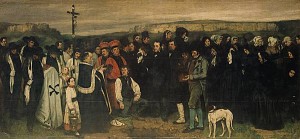The essay written by Holland Cotter dated January 17, 2014 in the New York Times (see article) has been discussed, passed around, worried over and maybe forgotten by now. The main point of the piece is how money has effectively polluted the art world, art making, and art discourse. In particular, abstract painting and the gallery infrastructure that supports it came in for some criticism, and not unfairly to my mind. Jerry Saltz has also been critical of the current art scene and abstract painting in particular. In the face of this criticism, some abstract painters have taken this a bit personally, feeling that they are being singled out as the problem.
I can’t help but suspect that these artists feel insecure about the value of their work. How else to explain the comments in the blogosphere where there is talk about the mere act of making a painting as being a “radical gesture” and/or “a political act”? Keep in mind that the artists in question make abstract, non-political work – it’s incredibly inoffensive stuff no matter where you might sit in the political spectrum. Apparently locking oneself away to apply paint to canvas in and of itself shows a revolutionary commitment.
The gist of the argument seems to center on the handmade object and the notion that in the digital age, these objects are somehow radical. Never mind that many abstract paintings appear to be made in a sort of factory-like fashion with a brush in one hand and an iPhone in another. And there is no attempt to grapple with the notion that nothing quite flatters and disseminates many of these abstract images better than the internet, a place where we can judge the power of our latest creations by the “likes” that we accrue.
I believe that painting is important. It’s a primal mode of expression that appeals to our deepest impulses. When infants stop smearing their shit on the nursery wall in delight or anger, only then may we say that painting is dead. When the power grid finally goes black and our screens go blank, we will be marking our walls with piss and blood out of boredom, if nothing else. We are material beings and as long as this is so, painting will be important.
Still, the making of these paintings somehow falls short, or is different than, a political act. There are those who believe that everything we do qualifies as such. They may be right and if you want to be that inclusive, then the sky is the limit and must number brushing one’s teeth as well as all the various quotidian functions that we perform. I have a different standard, and I suspect most people do as well.
But even if we allow this act of creation a political characterization (which I don’t, but you might), I can’t help but feel that making a painting, especially an abstract painting in New York in 2014, only rates as an extremely conservative, almost painfully regressive activity. How else can you characterize an act that produces decoration over some hedge fund manager’s sofa? And mind you, that’s what happens to our work if the gods are smiling.
Characterizing one’s studio time as a “political act”, “revolutionary” or “radical” is the the sort of tone-deaf, self-important pronouncement for which artists are routinely and rightly mocked. Dabbing at one’s latest “piece” is pretty weak tea when compared with protesting and dying in Kiev or whatever risky act that someone, somewhere, is taking part in or fomenting. The key word is “risky”. Let’s get real.

